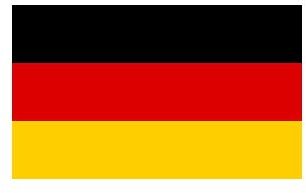Pronunciation, Umlaut and Phrases for Time and Direction in German
Vowels, Consonants and Umlaute
The German language has five vowels, A a, E e, I i, O o, U u and three Umlaute Ä ä, Ö ö, Ü ü as well as a special letter for double s, ß.
Pronunciation
Many Germans are used to - and highly appreciate - native English speakers who try their hand on German words and phrases. They
are aware of the idiosyncrasies and difficulties English speakers encounter when trying to get their tongue around particular German words and sounds like the umlaut and the ‘ch’. Although you should try to get it right, don’t be too concerned about not being understood.
The five basic vowels are either pronounced short or long, depending on the word.
A = sounds like the u in ‘fun’.
E = sounds like the ay in ‘day’.
I = sounds like the ee in ‘see’
O = sounds like the o in ‘over’
U = sounds like the ou in ‘you’.
Ä ä with 2 dots is an Umlaut and is also correctly transcribed as ae. It sounds similar to the a in ‘man’ or like ‘bed’.
Ö ö with 2 dots, also transcribed as oe, is tricky and a sound which does not exist in the English language. The closest would be the ir in ‘sir’ but with a mute ‘r’.
Ü ü with 2 dots, or transcribed as ue, equally does not exist in English. It’s pronounced like the French word ‘muse’.
‘ch’ as in the German word for “I” = ich, sounds like the h in ‘human’.
‘ch’ as in the German word for “small river” = Bach sounds much harder and is pronounced like the Scottish word ’loch’.
’ei’ as in the German word for ’near" = bei, sounds like the i in ‘while’.
ß or ‘ss’ is a sharp, short s, pronounced like the sc in ‘scissors’.
A few consonants
Difficulties are often encountered with v,w,f and j.
‘J’ is pronounced like in ‘yes’
‘V’ is pronounced like in ‘fight’
‘W’ is pronounced like in ‘victory’
‘F’ is pronounced like in ‘father’.
Question words - Fragewoerter
Here are some question words and simple phrases to get you around.
Wo = where
Wie = how
Wann = when
Wie lange = how long
Wer = who
Wo ist das Hotel? = Where is the hotel?
Wo ist ein Taxi? = Where is a taxi?
Wo ist die ….Strasse? = Where is …. street?
Wo ist ein Polizist? = Where is a policeman?
Wo ist ein Krankenhaus? = Where is a hospital?
Wie komme ich zu…? = How do I get to…?
Wie geht das? = How does that work?
Wer holt mich ab? = Who comes to fetch me?
Time
Bear in mind that Germans are generally punctual, so it’s a good idea to know about expressions for time. AM and PM are not used. Hours are indicated by numbers from 1 to 24. 11 o’clock means 11 AM and 23 o’clock means 11 PM. However, the rule is not strict. Where context makes it clear, numbers from 1 - 12 are used, but without AM or PM.
Wie spaet ist es? = What’s the time?
Wann faehrt der Zug? = When does the train leave?
Wann treffen wir uns? = When do we meet?
Viertel nach …= a quarter past…
Viertel vor…= a quarter to…
Um halb 11 = (literally: half eleven) but indicating 10.30 AM
If you get stuck, learn this phrase:
Bitte helfen Sie mir. = Can you help me please? The urgency for your need of help can easily be expressed by the tone of your voice and your facial expression.
Pronunciation
For online help pronouncing German words, try LEO, a German translator with pronunciation. Just type in the word you want to hear, and click on the speaker.
This post is part of the series: 30 most important German phrases
Learn about when to say Du and Sie, why the word Fraeulein has disappeared and the 30 most important phrases in German, starting with greetings and good bye.
